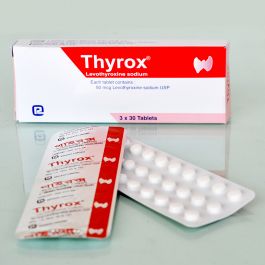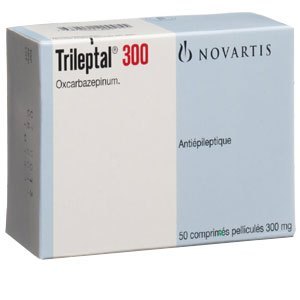Thyrox (Tab) 50mg
৳ 2.00
Indications
- As replacement therapy in hypothyroidism of any aetiology. Replacement therapy should not be instituted in transient hypothyroidism during the recovery phase of subacute Thyroiditis.
- For the suppression of Thyroid Stimulating Hormone (TSH) levels in the presence of goitres, nodules and after radiological and/or surgical treatment of Thyroid cancer.
- For the suppression of the goitrogenic effects of other drugs such as Lithium.
- As a diagnostic aid in suppression tests.
Therapeutic Class
Pharmacology
Dosage & Administration
- Initial starting dose: 25-50 meg/day, with gradual increments in dose at 6-8 week intervals, as needed. The Levothyroxine Sodium dose is generally adjusted in 12.5-25 meg increments until the patient with primary hypothyroidism is clinically euthyroid and the serum TSH has normalized.
- In patients with severe hypothyroidism: Initial dose is 12.5-25 meg/day with increases of 25 meg/day every 2-4 weeks, accompanied by clinical and laboratory assessment,until the TSH level is normalized.
- In patients with secondary (pituitary) or tertiary (hypothalamic)
- hypothyroidism: Levothyroxine Sodium dose should be titrated until the patient is clinically euthyroid and the serum free – T4 level is restored to the upper half of the normal range.
- For patients older than 50 years or for patients under 50 years of age with underlying cardiac disease: 1.7 meg/kg/day.
Pediatric Dosage Newborns: The recommended starting dose is 10-15 meg/kg/day. A lower starting dose should be considered in infants at risk for cardiac failure and the dose should be increased in 4-6 weeks as needed based on clinical and laboratory response to treatment. In infants with very low (<5 mcg/dL) or undetectable serum T4 concentrations, the recommended initial starting dose is 50 meg/day of Levothyroxine Sodium.
Infants and Children: In children with chronic or severe hypothyroidism, initial dose of 25 meg/day with increments of 25 meg every 2-4 weeks until the desired effect is achieved. Hyperactivity in an older child can be minimized if the starting dose is one-fourth of the recommended full replacement dose and the dose is then increased on a weekly basis by an amount equal to one-fourth the full recommended replacement dose until the full recommended replacement dose is reached.
- 0-3 months: 10-15 meg/kg/day
- 3-6 months: 8-10 meg/kg/day
- 6-12 months: 6-8 meg/kg/day
- 1-5 years: 5-6 meg/kg/day
- 6-12 years: 4-5 meg/kg/day
- >12 years but growth and puberty incomplete: 2-3 meg/kg/day
- Growth and puberty complete: 1.7 meg/kg/day.
The dose should be adjusted based on clinical response and laboratory parameters. In the treatment of goitres, nodules and Thyroid cancer, the objective is to ensure a constant and sufficient suppression of TSH. For suppression of TSH levels, a gradual increase in dosing is usually not necessary. For adults, the usual suppressive dosage of T4 is 2.6 meg/kg of body weight daily. When Levothyroxine Sodium is used as a diagnostic aid, the dosage depends on the type of investigation.
Interaction
- Oral anticoagulants: Thyroid hormones may enhance the activity of oral anticoagulants.
- Antidiabetic drugs: Thyroid hormones may cause increases in insulin or oral hypoglycaemic drug requirements.
- Digitalis preparations: Thyroid hormones may alter the requirement for Digitalis preparations.
- Cholestyramine: The absorption of Thyroid hormones may be decreased by Cholestyramine; therefore, there should be an interval of at least 4 hours between administration.
- Phenytoin: Phenytoin appears to enhance the metabolism of Thyroid hormones and may also displace T4 from TBG.
- Foods: In order to avoid irregular absorption Levothyroxine tablets should be taken preferably at a fixed time on an empty stomach with some fuilds. Simultaneous intake of food may decrease the absorption of T4.
Contraindications
Side Effects
Pregnancy & Lactation
Precautions & Warnings
- In patients whose hypothyroidism is due to a decrease in pituitary gland function, there may also be adrenocortical insufficiency;before starting Levothyroxine therapy, this should be treated by adequate replacement with Corticosteroids to prevent acute adrenal insufficiency.
- The choice of the starting dose and of any increases in dosing should be made with great care in patients with cardiovascular disease and/or severe and long-existing hypothyroidism.Too high an initial dose or too rapid an increase in dosing may lead to development or worsening of angina complaints, arrhythmias, myocardial infarction, cardiac failure or to sudden increase in blood pressure, especially in older patients.
- Any marked change of body weight during treatment with T4 requires adjustment of the dosage.
- When monitoring blood levels of T3 and T4, it should be borne in mind that a “high” normal to slightly increased T4 level will be necessary in order to obtain a normal level of T3.The correct dosage of Levothyroxine in primary hypothyroidism should generally be established by monitoring the serum level of TSH to see whether it has normalized.
- Because intoxication with Thyroid preparations may have serious consequences.





Reviews
There are no reviews yet.